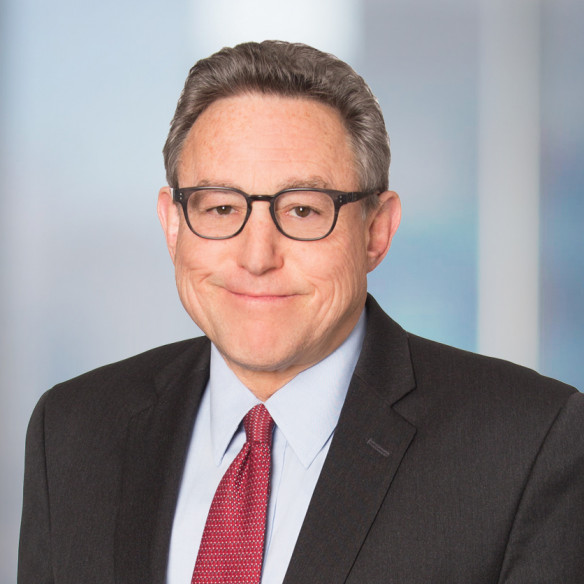Ed advises clients on health care transactions, regulatory compliance, health care payment and governance issues. His clients include for-profit and not-for-profit providers, vendors, GPOs, distributors and entrepreneurs. Ed frequently lectures on Medicare and Medicaid reimbursement, health care integration, not-for-profit law and corporate governance issues. He previously served as General Counsel of St. Luke's-Roosevelt Hospital Center, one of the largest teaching hospitals in New York.
1. Your background is in non-profits — prior to joining Proskauer you worked for the Legal Aid Society and then St. Luke’s-Roosevelt Hospital Center. Please share more about your background and journey to Proskauer.
I have always had a strong interest in pro bono/public interest law.
Going to the Legal Aid Society out of Harvard Law was an unusual choice, but one I never regretted. I met my wife of 40 years there, and became a health care lawyer as a result of the experience.
After Legal Aid Society, I joined my first private practice firm, then known as Rosenman. The hiring partner staffed me on a Medicaid reimbursement case for the New York Health and Hospitals Corporation (HHC) because he knew my Legal Aid background would make me an asset to the client and my growing practice, which I had begun to focus on the health care sector. While there, I also had the opportunity to make pro bono a part of my work. One of my most memorable and meaningful cases was representing two [wrongly accused] death row inmates. Because of our work, their sentences were rejected by the courts and they are alive today.
I then worked as General Counsel at St. Luke’s-Roosevelt Hospital Center, an opportunity I received based, in part, off of my work with HHC. At the time, St. Luke’s was the largest hospital in New York State. Their patients were mostly from Medicaid and uninsured populations. The health care system provided almost every form of care and I learned as much as quickly as I could.
After a few years at St. Luke’s, I knew I wanted to learn more to make the biggest impact on health care law, and when an opportunity opened at Proskauer, I jumped at it. But I never stopped caring about the public interest, and at Proskauer, I did not have to.
In order to make the biggest impact on health care law, I knew a law firm was the best path forward, but I never stopped caring about the public interest, and at Proskauer, I did not have to.
2. How does your past experience inform your approach when advising on legal, regulatory and business issues related to health care services?
A former Harvard professor once told me that as a lawyer you take on the values of your clients. I have been lucky in my clients. My time at St. Luke’s gave me insights into the operation of a large teaching hospital in the middle of a big city. In health law, that is the best training ground.
For example, I learned (i) the necessary interplay between administration —which is responsible for hospital operations generally — and the medical staff, which is generally responsible for the quality of clinical care, (ii) the complex requirements of the Joint Commission and federal and state regulators regarding hospital operations, (iii) reimbursement rules that rival the tax code in complexity, (iv) compliance requirements and challenges to such compliance, (v) tax exemption rules and their applicability to among other things, joint ventures and (vi) contracting and licensing IP, equipment and services.
3. What are some trends or legislative actions (such as the No Surprises Act) that will have an impact on the financial performance of health care service providers?
Rather quietly, health care providers are struggling. The No Surprises Act is reducing payments to out-of-network providers and many emergency departments, anesthesia and even cardiac groups are being effected very seriously. Patient volume is still not at pre-pandemic levels and costs are climbing. The Transparency Act requires public posting of rates for competitors to see and finding adequate staffing is a struggle. In addition to these factors, some state legislatures are now considering restricting private equity’s role in physician practice management. That restriction may severely limit potential capital injections that many providers need given the headwinds they are facing of late.
4. How have you seen health care law evolve since you started practicing?
When I started practicing, health law was not considered its own specialty practice. It evolved into a specialty defined by a group of regulatory specialists with knowledge of the arcane and unique health care rules in the U.S. But nearly every “health care lawyer” then was still a generalist. Today, there are any number of specialties within the industry and thousands of health care lawyers helping to define it, just as there are doctors to medicine.
5. As heath systems grow larger and acquire more practices, what has been the biggest compliance challenge?
Compliance due diligence has always posed a challenge for some acquired practices. Buyers need to evaluate the potential risks and issues prior to the close of a transaction. In some instances, sellers may not have had the proper business processes in place to ensure compliance with various health care laws and regulations. It goes with the territory of being large and integrated.

